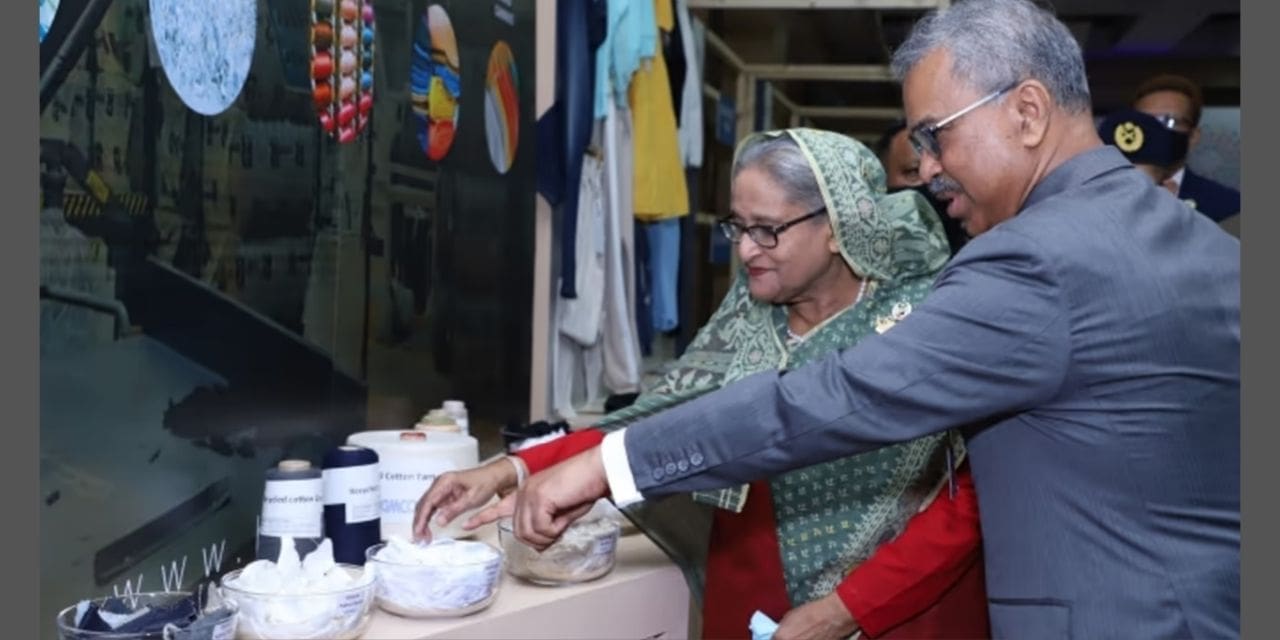Bangladesh is ready to take on a global role in handling fashion waste.
“We will do whatever policy is required to make Bangladesh the world hub for recycling ,” said Salman F Rahman, aprivate industry executive and investment adviser to Prime Minister Sheikh Hasina, in a speech at Made in Bangladesh Week .
Amid hours of discussion on various issues facing the garment industry, the topic of fashion waste and the circular economy came up repeatedly. The event, organized by the Bangladesh Garment and Manufacturing and Exporters Association ( BGMEA ) in partnership with the Bangladesh Apparel exchange, was a key gathering for the country which sports a $42.21 billion apparel export industry, the second largest in the world after China.
Many salient points were raised related to protecting the environment, but doing so in ways which could save manufacturers money and bring much needed foreign exchange to the country.
The apparel industry in Bangladesh has continued to evolve after a series of unfortunate tragedies, among them the collapse of the eight story Rana Plaza in 2013, and a fire in which more than 100 workers lost their lives in 2012. In the time since, there has been a consolidated effort at restructuring and safety. With more than four million workers in its employ, Rahman said that the industry has changed lives and empowered millions of women. That the industry is clearly looking at other ways of transformation was built into the conference’s theme : “‘Transforming fashion together.”
The speakers and those in attendance counted a variety of stakeholders including ministers, bureaucrats and ambassadors from other countries. Global brands, retailers and manufacturers were paying attention too, and it was clear that new promises—that can be recycled to the tune of billions of dollars—would come to fruition easier if entrepreneurs and the government shared a common vision.
It seemed that the entrepreneurs, who had already been talking about the beginning of a new phase, were ready. Seen in the expansive area of Dhaka’s International Convention City Bashundhara (ICCB) where the event was held, the organizers wore black T shirts with large white letters on them, quoting Annie Leonard of Greenpeace: “There is no such thing as away. When we throw anything away it must go somewhere.” 
The sense of recycling being an urgent issue to build upon was also apparent with a more global tie-in at the 37 thWorld Fashion Convention organized by the International Apparel Federation (IAF), held under the umbrella of the Made in Bangladesh week, at the Radisson Blu Water Garden hotel.The gathering was focused on finding solutions to a set of imminent challenges for Bangladesh’s industry, including supply chain collaboration and purchasing practices, climate action, education and digitalization and raw material recycling and availability.
Matthijs Crietee , secretary general, IAF, told Sourcing Journal that the tie between recycling and what the Bangladesh government intends to focus on, would be an important way forward.
“There is money locked in the supply chain. You can release that money by giving discounts, or demanding better pricing—but there is a chance of dividing extra money together. It’s also a platform to divide the extra risk,” he said. “What I always find important is the talk is about the business process of change, and this includes other ways of dealing with fashion risk in the supply chain. A new way forward could bring in an extra profit that could be shared—and is a way out of the situation where manufacturers are asking the brands to pay more. You can either keep having this little dance of negotiating purchase prices till the cows come home—or you can also look at the process and see how it can be done better,” he said. “Sharing risk and rewards is a good slogan and a way of looking ahead.” Brands shared a similar assessment.
Francisco Javier Losada Montero, chief sustainability officer, Inditex , noted that the traditional textile industry was leading innovation by creating new fiber from waste. “This option for circularity is going to become a new way of doing things, it will oblige us to double think all our processes,” he said.
“Bangladesh is very well positioned to address this, with the additional value of technology, digitization and collaboration,” he pointed out, adding that the pillars of change would be a focus on fiber, reviewing processes and protecting bio diversity.
“This is a way to guarantee the growth, to reveal and transform the fashion industry—sustainability, innovation, circularity, bio-diversity and to achieve all this the need for collaboration,” he said.
The notion isn’t entirely new, of course. Syed Naved Husain , group director and CEO at Beximco, which operates one of the largest integrated textile production businesses in Asia, spoke about the company’s partnership with Recover Textile Systems —a Spanish recycling technology company that specializes in turning textile waste into premium fibers—to become the world’s largest collector and recycler of textile waste and a specialized spinner of high quality recycled yarn. Recover collects and sorts textile waste from around the world to produce new fibers that contain recycled cotton, blended with other recycled materials such as polyester. The high percentage of cotton means that such yarn can be used in the production of high-end textiles.
He said there were important points to think through: How do you source wastage, what were the real policy recommendations for the government, how to overcome the challenges of the informal sector? There were ideas, too—like taking the post-consumer waste and bringing it into Bangladesh duty free to recycle. “It is an opportunity to make Bangladesh the biggest hub of recycling,” he said.
As the IAF ‘s Crietee put it, “In some ways, in Bangladesh they are more eloquent, and the voices are louder than other countries, but their concerns aren’t just those of Bangladesh, but concerns of the other manufacturing nations as well. But in Bangladesh the government is also involved, and they manage the policy, which can really help for change.”

